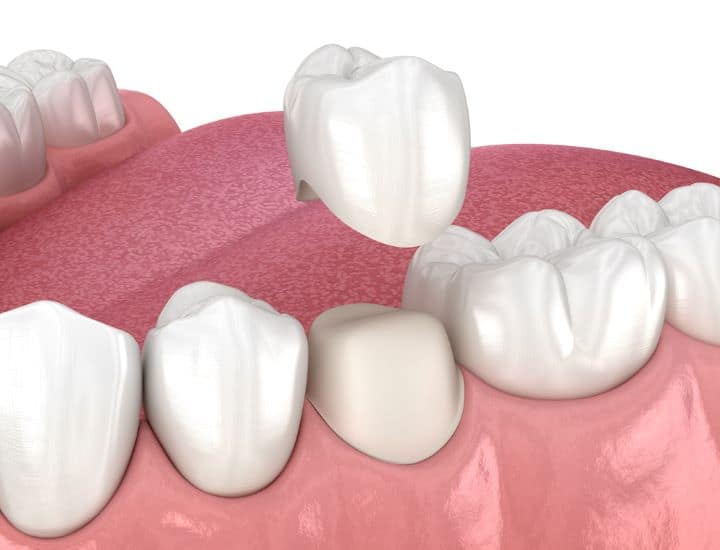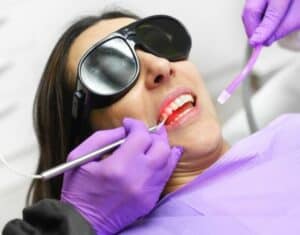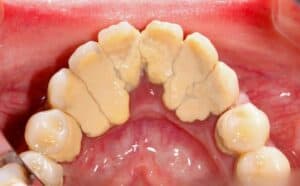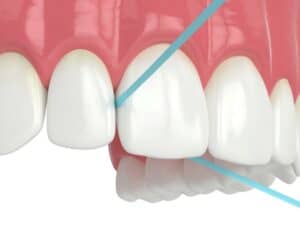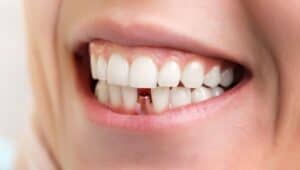Supragingival calculus, dental calculus, or tartar is a mineralized dental plaque deposit that hardens and accumulates on the exposed surfaces of the teeth, especially on the gum line.
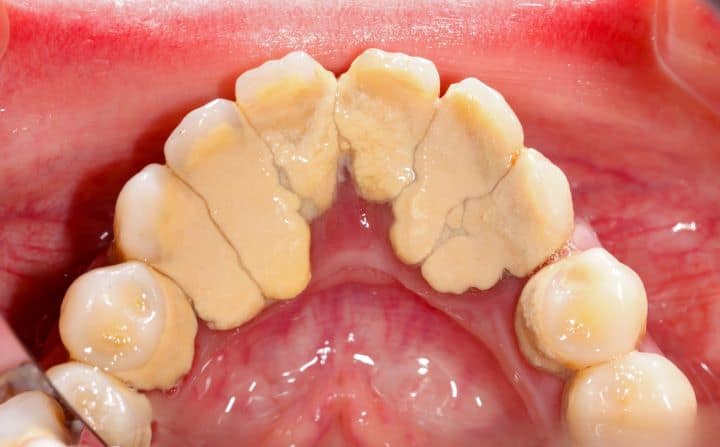
Calcium and phosphate minerals present in the saliva with some organic matter and bacterial debris are the components of calculus.
Dental calculus forms when the calcium and phosphate ions present in the saliva deposit onto the soft dental plaque and harden over time. Subgingival calculus forms from the subgingival plaque hardened by mineral deposits.
Causes of Supragingival Calculus Formation
Several factors might contribute to the formation of dental calculus, some of which are:
- Poor Oral Hygiene– improper methods of brushing and flossing as well as infrequent brushing and flossing will lead to the deposition of dental plaque. If this plaque is not removed, the minerals in the saliva will deposit on it and lead to calculus deposits.
- Food Habits– excessive consumption of sugary and starchy foods leads to an increase in the bacterial load of your oral cavity. This, in turn, causes rapid plaque deposition, therefore causing supragingival and subgingival calculus formation.
- Salivary composition of an individual: The varying composition of saliva in individuals can lead to varying degrees of calculus deposition.
- Tobacco use– any form of tobacco, whether chewable or smokable, alters the oral environment drastically. This altered oral environment is conducive to plaque and calculus deposition leading to rapid accumulation of plaque and subsequent calculus buildup.
Impact of Supragingival Calculus on Oral Health
Supra and subgingival calculus deposits have a detrimental effect on your oral cavity as listed below:
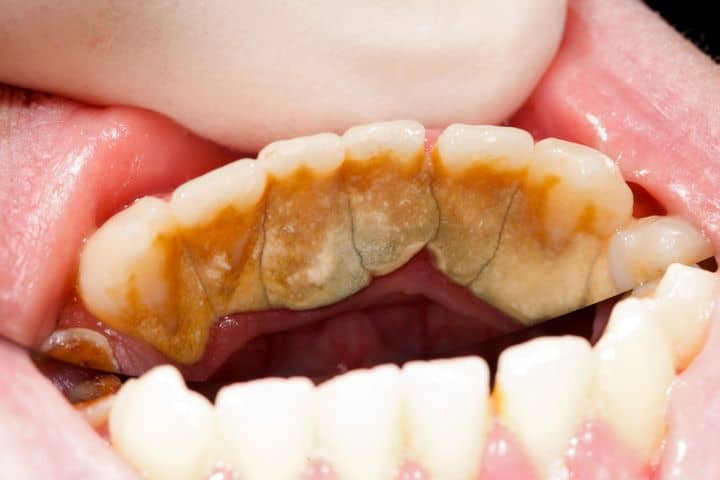
- Inflammation of the Gums or Gingivitis– The formation of calculus causes irritation and inflammation of the gums also called gingival inflammation or gingivitis. The gums become red and swollen due to the increased blood supply to them caused in response to the bacteria present in the calculus. This also makes the gums prone to bleeding upon the slightest provocation such as brushing.
- Periodontal disease– if ignored at the inflammation stage, the gingival inflammation can progress into a more severe form of gum disease called periodontitis. Periodontitis or periodontal disease is characterized by gumline recession, bone loss, and mobility of the teeth. If still ignored, this can result in tooth loss.
- Bad Breath/ Halitosis– the bacterial plaque and calculus covering the tooth surface cause a persistent foul odor emanating from your oral cavity. This happens because of the bacterial decomposition of the food debris trapped in the pockets formed by gum recession.
- Dental Aesthetics– the calcified dental plaque or tartar is yellow-brown in color and discolored teeth may affect the aesthetics and self-confidence of an individual.
Treatment of Supragingival Calculus
A dental professional or dental hygienist will diagnose the health of your gums through visual examination as well as tactile examination by dental instruments such as a dental explorer and periodontal probe.
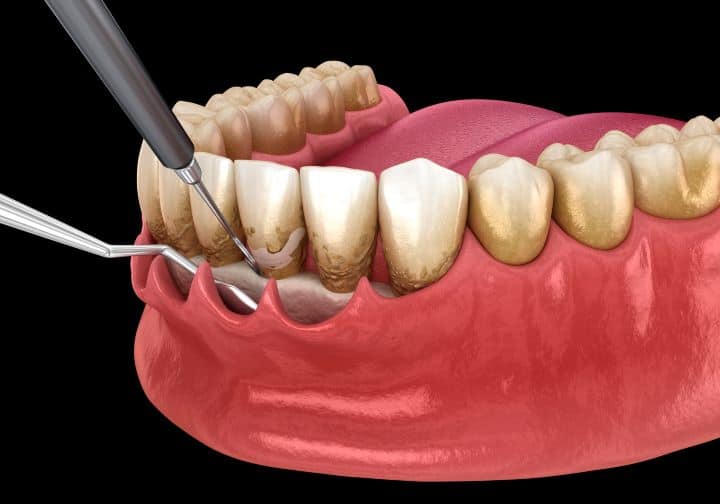
For progressive gum diseases, a dental x-ray might be needed to reveal subgingival plaque and calculus. The following are the treatment options:
- Scaling– dental scaling is primarily used to remove the supragingival calculus. The procedure is done using manual instruments to scrape off or remove calculus or ultrasonic instruments might be used to break them off.
- Root planing– root planing is done to remove the subgingival calculus which is greenish-black in color and is attached to the tooth roots. Both, scaling and root planing might be needed to get rid of the calculus completely.
- Oral hygiene education– by educating patients about the importance of maintaining oral hygiene diligently, dental professionals can prevent the diseases associated with dental plaque and calculus.
- Regular dental cleanings – routine dental cleanings every six months ensure the optimal oral health of an individual. However, the frequency is best determined by your dentist.
Preventative Measures
calculus and periodontal diseases can be easily prevented by good oral care and routine dental visits. The following tips can help you prevent them-
- Brushing and flossing– brush your teeth with a soft-bristled toothbrush and fluoride toothpaste twice a day. Floss regularly to prevent food lodging and dental decay.
- Healthy diet- reduce sugar in your diet and incorporate fruits, vegetables, and protein instead.
- Routine dental check-ups– regular visits to your dentist will help diagnose oral diseases at an early stage and get treated with minimal intervention.
Supragingival calculus can impede your dental health if not taken seriously.
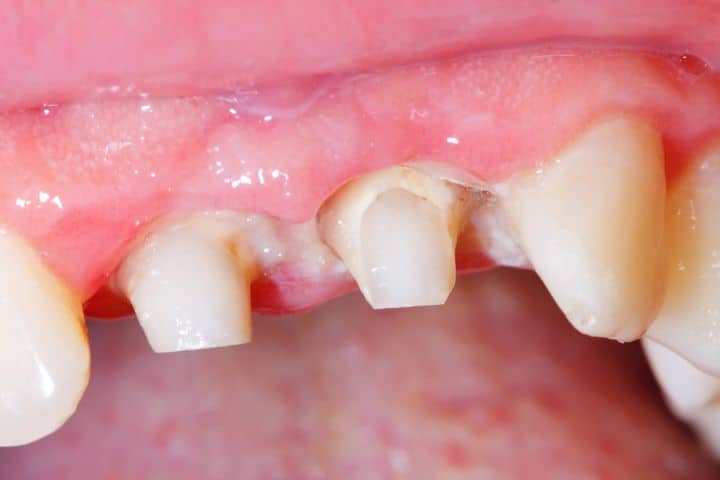
By understanding its implications, causes, and preventive measures, you can proactively take steps to achieve optimal oral health.
Through diligent oral hygiene measures and dental professional help, gum diseases can be effectively managed ensuring you have a healthy and confident smile for years to come.


